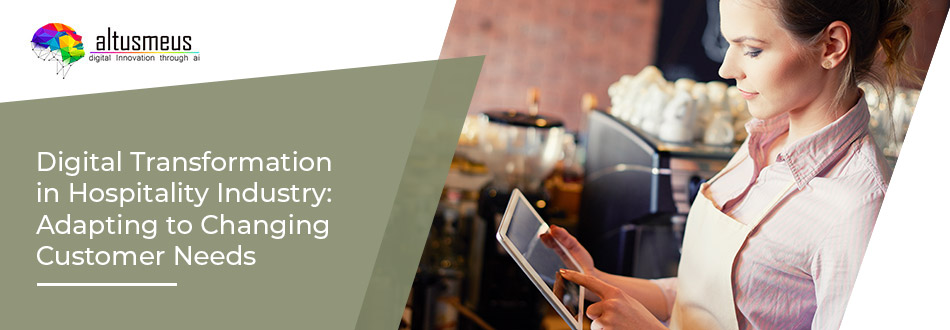When we think of hotels, resorts, restaurants, and other hospitality establishments, we imagine relaxation, entertainment, a stress-free environment, happiness, comfort, and friendly people. Customers always expect the best experience from the hospitality industry, but due to the ever-changing needs of consumers, the industry sometimes fails to meet their expectations. Like any other industry, the hospitality industry is subject to change and is adapting to the changing environment, behaviours, and needs of its customers.
The swift progress of digital technology has revolutionized our daily lives and the way we communicate and perform tasks. The impact of digital technology has transformed the way we purchase and enjoy entertainment, and the hospitality industry is no exception. To provide better service and experiences to customers, the industry has embraced digital transformation to keep pace with evolving demands.
The hospitality industry is adopting digital transformation to enhance its customers’ experience. Here are a few examples of how hotels, resorts, and restaurants are using technology to improve their services:
1. Online booking systems: Many hotels now provide customers with the ability to book rooms directly through their website or mobile app, as well as popular third-party platforms like Trivago, Expedia, Booking.com, and Airbnb. This convenient feature allows customers to easily compare different hotels, available rooms, services, and ratings, enabling them to select the best option that meets their preferences and needs.
2. Applications: Mobile apps have become a popular way for hotels to enhance their customers’ experience. Many hotels now offer their own mobile apps that not only allow customers to book rooms but also perform a variety of tasks such as checking in and out, ordering room service, and controlling room amenities like lighting and temperature. Some hotels even provide guests with tablets that are pre-installed with their app to further streamline their stay.
3. Contactless payment: Many hotels have implemented contactless payment options, allowing guests to pay for their stay without the need for physical contact. This can be done through digital payment apps or other contactless payment methods, making the payment process more seamless and hassle-free for guests. By offering this convenience, hotels can enhance the overall guest experience and create a more memorable trip for their customers.
4. Service customization: Personalized service has become a key focus in the hospitality industry, with many hotels utilizing a variety of apps and gadgets to gather valuable information about their customers. By analyzing this data, hotels are able to create a customized experience for each guest. For example, hotels can suggest activities or locations that would be of interest to their guests based on their preferences and travel history. Additionally, hotels are now able to provide food options based on the dietary restrictions and preferences of their guests, thanks to the information they have collected. By gathering feedback through digital gadgets from guests about their experience, hotels are able to make appropriate changes to improve the overall experience for future guests with similar preferences. This focus on personalization and customer feedback has significantly enhanced the hotel experience for many guests.
5. Chatbots: The hotel industry often struggles with addressing customer queries, particularly during times when there may be limited staff available. This can result in long wait times and frustration for customers seeking assistance. However, with the introduction of technology such as chatbots, hotels have been able to efficiently handle customer inquiries, providing quick and effective customer service. This technological advancement has significantly improved the overall customer experience, ensuring that customers receive the support they need in a timely and effective manner.
6. Digital Marketing: Marketing strategies have undergone a significant transformation due to the rapid advancements in the internet, computing, and digital technology. Nowadays, with the widespread availability of internet access, individuals use their devices for various purposes, such as researching products before making a purchase or shopping online. Given this shift in consumer behaviour, and the increased use of social media platforms and the internet, many hotels have turned to these platforms to engage with their customers, promote their services, and gather feedback. To reach a wider audience, many hotels have created their own websites and social media accounts, which they use to showcase their offerings, share updates, and respond to customer inquiries and feedback. This has enabled hotels to establish a stronger online presence and build better relationships with their customers.
7. Virtual reality: To address the issue of potential customers not fully understanding what a hotel room will look like in person, many hotels have started using virtual reality technology. This technology allows customers to view the hotel rooms and other areas of the hotel on the hotel’s booking website, app, or even third-party websites. By providing customers with an immersive virtual tour, hotels are able to give them a more accurate representation of what they can expect during their stay. This helps customers make more informed decisions about their booking and ultimately results in a better customer experience.
Conclusion
The hospitality industry is in a constant state of evolution, and the rapid advancements in digital technology have transformed the way hotels and other hospitality establishments operate. The introduction of various digital tools such as online booking systems, mobile apps, contactless payment methods, personalized services, chatbots, digital marketing, and virtual reality has enabled the industry to offer a better experience to customers. These digital innovations have helped hotels and resorts meet the changing needs of customers by providing more personalized, convenient, and immersive experiences. By embracing digital transformation, the hospitality industry is setting new standards for customer service, making travel and vacation experiences more enjoyable and memorable than ever before.





